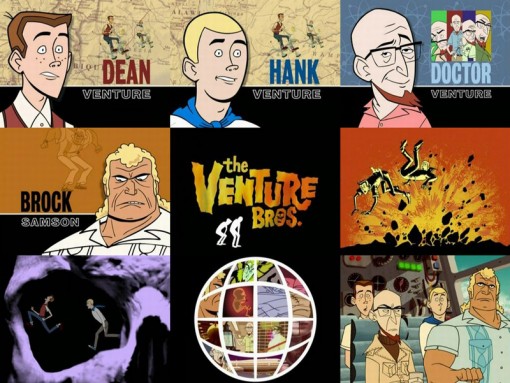Show creators Doc Hammer and Jackson Publick discuss tackling season five of The Venture Bros. for Adult Swim, and what keeps fans coming back for more.
Back in 2003, as Adult Swim viewers were enjoying spoofy recycles of defunct toon heroes in shows like Space Ghost Coast to Coast, The Brak Show and Harvey Birdman: Attorney at Law and the irreverent mayhem of Aqua Teen Hunger Force, a new toon stepped on to the late-night block. A sort of homage to old school action series Jonny Quest, Doc Hammer and Jackson Publick’s The Venture Bros. brought fresh, half-hour adventures, a modern design sense, high production values and an impressively in-depth, character-driven sense of humor to the schedule. And viewers responded.
Now in its fifth season, Venture Bros.—for the uninitiated—follows the adventures of the Venture family: father Rusty, a morally challenged super scientist; sons Dean and Hank, equal parts heart-of-gold do-gooders and bumbling Hardy Boys; “reformed” child molester Sgt. Hatred, their bodyguard; and the scheming, butterfly themed super-villain The Monarch, who is joined in his evil plots by his life partner in crime Dr. Girlfriend (now Dr. Mrs. The Monarch) and inept Henchmen. Over the course of the last 10 years, the Ventures’ world has grown exponentially to encompass dozens of characters, nemeses, relationships and inside jokes—many of which fans can expect to encounter again in the new 10 episode season.
“Not to toot our own horn, but I think we made a show that almost demands repeat viewings,” says Publick, who wrote and did storyboards for toons like The Tick, PB&J Otter and Sheep in the Big City before his big break. “We make it pretty dense; you can watch it over and over and catch new things each time … Season five will be more of the same, some of the new, some of the forgotten about for a long time.”

Or, as his co-writer/director/exec producer Hammer puts it:
“You’ll see some of the people you never cared about that now we care about—and maybe some of the things you do care about.”
The Season That Almost Wasn’t
For all the show’s appeal (hey, we’ve all seen a Monarch Henchman or two roaming the halls of Comic-Con), when season four ended with the hour-long “Operation P.R.O.M.” finale back in November of 2010, wrapping up lots of loose ends, a ripple of panic spread through the fandom. Was this the end of the Ventures? Would Adult Swim greenlight another season? As Publick recalls, the creators were asking the same questions.
“When we were making that season, we weren’t sure if it’d be the last one. Our contract was up and we were kind of done with the studio we were working with; we were kind of beat up with that season’s extended split,” he explains. “We didn’t know until we were rewriting that script [for the finale], and had ideas for five new episodes. Then we were like, ‘We gotta do a new season! … We gotta get new agents!’”

Hammer adds that this uncertain attitude allowed them to deliver a finale episode that felt like a true series wrap-up. However, they were clearly just as busy thinking of how to unravel new threads for the Ventures to weave back together.
For season five, Hammer and Publick teamed up with a new studio partner: L.A.’s Titmouse, Inc., which also handles the animation for Adult Swim’s Superjail! and Metalocalypse. The creators note that they’re still putting Venture Bros. together in much the same way, but with a slightly larger crew and a little more streamlined process. Designs and color are handled in Photoshop, boards in Storyboard Pro, After Effects is used for post effects and Final Cut for editing—all pre-production, boarding, design, color, x-sheet direction, edition and final compositing is handled in-house at Titmouse. Korea’s eMation uses After Effects for compositing and animates the 2D series using RETAS!PRO.
As Titmouse producer PeeDee Shindell notes, key challenges to the series production are the usual language difficulties in dealing with the overseas service animators, and the fact that the show gets more and more complex with each season. Hammer and Publick’s years of experience on the show have lead to them building in longer lead times and “logistical weeks” for production with this season—more time for storyboarding being a key priority.
Summoning the Henchmen
When asked if they have had any strange fan encounters over the years of running their cult-hit show (the duo did a press event for the new season at last year’s Comic-Con International) the creators are more pleased to have fans than weirded out by their antics.

“It’s more of an awe of walking into a room that big [for a panel] that’s full of people dressed as people you made up,” Publick observes. “The fans are cool. And if they weren’t, we wouldn’t do this.”
While they can’t reveal all the secrets of their success—or how they keep coming up with wild adventures for the Ventures—Hammer, also a talented musician whose career has encompassed acting, composing and producing vfx for a number of indie films, takes a psychological approach to the question.
“Part of it is the amount of time in between seasons … we give them almost enough and they hold on, then we come back and the story keeps going. It’s almost like we engineered a cult sort of thing,” he says. “We canceled our show, and kept coming back—we’re like Star Trek. I think fans almost feel like their clamor has brought the show back.”
Publick adds that the long breaks between seasons, or in the middle of seasons, also give fans a chance to really enjoy what’s come up and share it with their friends. The character-driven humor is also key to the attachment viewers feel to the show, and helps guide audiences through the ever-evolving world of The Venture Bros.

“We learn things every year and we get more deeply into things every year. I feel like the first few seasons were about expanding, and now we’re kind of about developing what we expanded more deeply,” he summarizes.
“I don’t think we’re ‘upping the ante,’ I think we’re playing one long card game … we keep making up rules, and it’s the weirdest f—ing card game anyone’s ever seen,” adds Hammer. “Jackson and I have this unique freedom to explore whatever the f— we want, because the show is bizarre … Most of our ideas, if we had to pitch them to a room full of people, they would die. Someone would stop us. But we don’t have to do that, so we get to develop these things that are almost fetishized. We get to sell them to people who accept them.”
On Failing to Fail
An oft-cited theme of the show is “Failure”—something that seems counter-intuitive for two successful young creative types to focus on. But as the creators explain, the show is not really about the pratfall humor of not succeeding, but about the subjectivity of success and failure, and the very human realities of the balancing act between them.
“Life is just a bunch of failures, and that’s how we learn,” Hammer notes. “I guess when we say [the show] is about failure, it’s about these tiny moments that don’t mean anything, but when you look back on it, they mean everything. So, the show’s about life! … No one in the show is a big success, unless we put them there to show everyone else their failure.”
“And our successful characters are kind of … dicks,” adds Publick. “The good guys are a little horrible, the villains are real people you can sympathize with when they’re horrible.”

So, in a way, failure is in fact part of the show’s success! Err, probably?
Speaking of success, we could not let the creator’s of one of Adult Swim’s fan-favorite cartoons off the phone without pumping them for advice for other aspiring show creators. Publick and Hammer agree that if you have a good idea, someone will want to watch it—whether on a big TV network or on YouTube. They also note that if your idea doesn’t take off, you could be a victim of circumstances—or, more likely, it just wasn’t as good as you thought. Regardless, the creators agree that the key to making it is to believe in your project, get it out there and work constantly to hone your talents and fine-tune your ideas.
It also won’t hurt, they say, to step back and focus on other things for a while.
“[Venture Bros.] didn’t happen until the moment I said, ‘I don’t care if I get my own show,’” says Publick, who conceived the story as a comic and had his share of unsuccessful pitch sessions for the series. “I was thinking about wanting my own show instead of what I was making at the time. It’s a crazy way to go through life, not being happy about it. I said, screw that, I’m going to make this as a comic or something, put it on Post-Its to amuse myself—the doing it is what’s important to me. As soon as I did that, I did better stuff and somebody wanted to make my show.”
“It’s like when you get dumped and you’re desperately looking for someone to be with,” Hammer observes. “The moment you stop caring—the moment you decide you don’t need f—ing anyone in your life—you find someone.”
Just as the moment we all thought we were saying goodbye to The Venture Bros., it came waltzing back into our lives—thank goodness!
The Venture Bros. season five launches on Adult Swim June 2 with a two-part episode. (The Animag staff wish Publick and Hammer luck with their post-shower deodorant application struggles, the discussion of which took up much of the interview time for this story).











